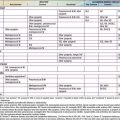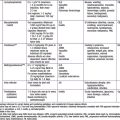Chapter 318 Esophageal Varices
Portal hypertension is defined as an elevation of portal venous pressure to levels 10-12 mm Hg higher than pressures present in the inferior vena cava (Chapter 359). Decompression of this hypertension through portosystemic collateral circulation via the coronary vein, in conjunction with the left gastric veins, gives rise to esophageal varices. Most esophageal varices are “uphill varices”; less commonly, those that arise in the absence of portal hypertension and with superior vena cava (SVC) obstruction are “downhill varices.” Their treatment is directed at the underlying cause of the SVC abnormality. Hemorrhage from esophageal varices is the major cause of morbidity and mortality due to portal hypertension. Presentation is with significant hematemesis and melena; whereas most patients have liver disease, some children with entities such as extrahepatic portal venous thrombosis might have been previously asymptomatic. Any child with hematemesis and splenomegaly should be presumed to have esophageal variceal bleeding until proved otherwise.
Treating children who have varices with prophylactic sclerotherapy with the goal of preventing an initial hemorrhage can decrease the incidence of esophageal bleeding. Treated patients can bleed from congestive gastropathy, and no improvement in survival rate may be seen. Nonselective β blockade, such as with propranolol, has also been used to prevent variceal bleeding. Endoscopic variceal ligation in adults reduces the risk of first-time variceal bleeding when compared with untreated controls as well as patients treated with β blockade; a decrease in mortality is only noted in comparison to the control group (Chapter 359). Shunt surgery may be required in refractory cases.
Abd El-Hamid N, Taylor RM, Marinello D, et al. Aetiology and management of extrahepatic portal vein obstruction in children: King’s College Hospital experience. J Pediatr Gastroenterol Nutr. 2008;47:630-634.
Cardenas A, Gines P. Portal hypertension. Curr Opin Gastroenterol. 2009;25:195-201.
Ling SC. Should children with esophageal varices receive beta-blockers for the primary prevention of variceal hemorrhage. Can J Gastroenterol. 2005;19:661-666.
Simon EG, Joseph AJ, George B, et al. Aetiology of paediatric portal hypertension—experience of a tertiary care centre in South India. Trop Doct. 2009;39:42-44.




